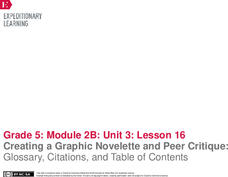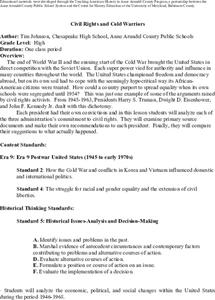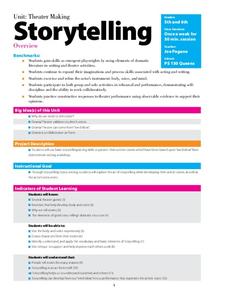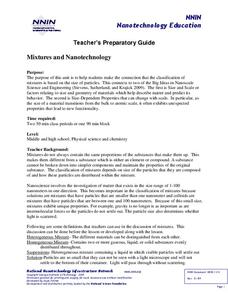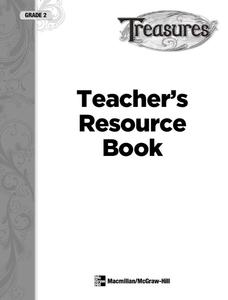EngageNY
Creating a Graphic Novelette and Peer Critique: Glossary, Citations, and Table of Contents
A, B, C ... let's alphabetize to get organized! Using the informative resource, scholars create an alphabetized glossary of key words for their graphic novelettes. Additionally, they create a table of contents and citations page.
Intensive Intervention
Fractions as Numbers
Your learners will enjoy thoroughly understanding fractions, and you will appreciate the abundant, quality resources in this comprehensive unit that builds toward a complete understanding of the concept of fractions as numbers. Many...
Curriculum Corner
Coniferous and Deciduous Trees
What are the differences between coniferous and deciduous trees? Supplement your tree lessons with a set of activities that has learners describing, naming, comparing, and reading about deciduous and coniferous trees. The activities are...
Curated OER
Study Guide for Missing May
Use this comprehensive packet to accompany a study of Missing May by Cynthia Rylant. Starting out with a brief author biography and background information about the novel, this guide includes materials to use throughout the entire novel....
LABScI
Taxonomy: Who is in My family?
Find similarities in seemingly unlike organisms. The second instructional activity in a series of 12 builds the concept of a taxonomy and explores the use of a dichotomous key. Learners begin in part one by attempting to group a set of...
Curriculum Corner
English & Spanish School Word Cards for ELL
Transition young English language learners back to school with this set of vocabulary cards. Addressing common classroom vocabulary like teacher, backpack, and crayons, this set of cards is perfect for developing the language...
Curriculum Corner
Hibernation
What is hibernation? Which animals hibernate and which don't? A 40-page packet on hibernation includes graphic organizers, reading passages and pictures about animals that hibernate, task cards, templates for a hibernation booklet,...
American Chemical Society
Testing Materials to Learn About Their Properties
Storing food in plastic makes more sense than storing it in paper. Young learners research the properties of these materials along with aluminum foil. They then connect the properties of the materials to their usefulness by completing a...
Center for History Education
Civil Rights and Cold Warriors
Three presidents, three views on civil rights. Scholars compare the administrations of President Truman, Eisenhower, and Kennedy to understand how each addressed the issue of civil rights. The lesson uses primary sources and graphic...
West Contra Costa Unified School District
Matching Quadratic Functions
Ever sigh when learners ask why they have to know so many different forms of the quadratic equation? Here is a lesson that comes in handy! Using hands-on matching activities, quadratic equations are explored through...
National Wildlife Federation
Bison Mystery Box
Natural design is amazing. Young scientists connect the features of a bison to an assortment of everyday items. A bison's tail is an ideal flyswatter, and a pot stores water just like a bison's stomach. The instructional activity...
Purdue University
Coloration Exploration
Finding an animal in nature can be like a game of hide and seek. A thorough lesson explores different coloration strategies of animals. Pupils complete look-and-find puzzles and coloring sheets to differentiate between different types of...
New York City Department of Education
Theater Units for Lower and Upper Elementary Levels
Introduce middle schoolers to playwriting and the elements of drama with a six-session storytelling unit that encourages kids to expand their acting and writing skills. The 12-page packet includes overviews of the lessons,...
McGraw Hill
Study Guide for Island of the Blue Dolphins
Dive your class into a reading of Island of the Blue Dolphins with this in-depth study guide. Breaking the novel into three parts, the resource begins each section with a focus activity that identifies a specific theme or question...
Teaching Tolerance
Why Do We (Still) Celebrate Columbus Day?
What are we really celebrating on Columbus Day? The resource explores the narrative behind Columbus Day and ways for people to change the perception. Scholars also review vocabulary terms associated with the topic and how attitudes have...
Teaching Tolerance
Where We Stand
Everyone is entitled to their own opinion. Academics learn strategies to share their opinions and agree or disagree with others in a respectful manner. The resource provides scenarios to help individuals form opinions and share them with...
Prestwick House
Anne Frank: The Diary of a Young Girl
Pre-reading worksheets, discussion prompts, activity ideas, research assignments, and more await you in this resource for supplementing your class reading of The Diary of a Young Girl by Anne Frank.
Florida International University
Designing an Autonomous Underwater Vehicle (AUV): Concepts in Lift, Drag, Thrust, Energy, Power, Mass, and Buoyancy
Engineer an autonomous underwater vehicle (AUV) to study concepts of physics. Using household materials, collaborative groups design and build an AUV and then test Newton's Laws of Motion as they apply them in underwater environments...
Lerner Publishing
Meet the Dinosaurs
Take your class of youngsters on a prehistoric adventure with this four-lesson series on dinosaurs. Accompanying the Meet the Dinosaurs books by Don Lessem, these lessons engage children in writing their own dinosaur books,...
Beyond Benign
Solvent Snapshot
Discover the properties and purpose of chemical solvents. Continuing with the theme of shampoo ingredients, the 10th lesson of this 24-part series investigates the choice of solvents in shampoos. Through their exploration, they learn how...
National Nanotechnology Infrastructure Network
Mixtures and Nanotechnology
What does size have to do with it? Learners analyze different mixtures, both homogeneous and heterogeneous, to discover the properties related to the size of their particles. The activity connects these properties to those of...
Southwest Educational Development Laboratory
Simple Machines
Simple doesn't mean useless. Individuals learn how simple machines benefit the user by changing the amount of effort. A seven-lesson unit begins with an overview of simple machines and then incorporates activities that allow the user to...
EngageNY
The Side-Angle-Side (SAS) and Side-Side-Side (SSS) Criteria for Two Triangles to Be Similar
Playing with mathematics can invoke curiosity and excitement. As pupils construct triangles with given criteria, they determine the necessary requirements to support similarity. After determining the criteria, they practice...
McGraw Hill
Phonics Teachers Resource Book
Looking to improve your classes literacy program? Then look no further. This comprehensive collection of resources includes worksheets and activities covering everything from r-controlled vowels and consonant digraphs, to the...


